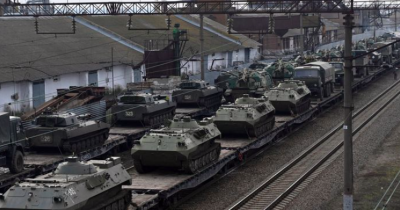Russia Uses Military Force to Prevent Ukrainian Violence in Donbass

All Global Research articles can be read in 51 languages by activating the “Translate Website” drop down menu on the top banner of our home page (Desktop version).
To receive Global Research’s Daily Newsletter (selected articles), click here.
Visit and follow us on Instagram at @globalresearch_crg.
Incisive geo-political analysis
Global Research does not support Russia’s invasion of Ukraine.
A bilateral Peace Agreement is required.
***
Western media agencies are in shock with the events that took place in Ukraine in the last 24 hours. Operations carried out by Moscow against military targets with the aim of neutralizing Ukrainian aggression are causing scandal, motivating international pressure through repudiation and severe financial sanctions. However, the issue has been analyzed from an extremely superficial point of view, with Russia being treated as an “aggressive dictatorship” and Ukraine as a “victimized democracy”, which does not correspond to the reality of the facts.
What the West had been eagerly waiting for has finally happened: Russia has hit targets inside Ukrainian territory. For Kiev and its allies, this would be an “invasion”. For any minimally rational and neutral analyst, it is just a war, in the purest sense of the term. For the past eight years, the war in Donbass has been seen by Moscow as a civil conflict, within the exclusive competence of the Ukrainian state. Russia has respected Ukrainian sovereignty throughout this time, demanding only the observance of the Minsk Accords and an end to the indiscriminate killing of the ethnically Russian population in the east. However, the continuity of the Ukrainian aggression led the Russian government to recognize Lugansk and Donetsk as countries, which absolutely changes the way of interpreting the conflict: it is no longer a civil war, but a war between different national states.
With that, Russia started a peacekeeping mission in order to protect the people of Donbass. Considering that Ukraine is the aggressor state in this war, pacifying the Donbass means, collaterally, fighting the Ukrainian armed forces and their allied paramilitary militias. So, in practice, the peacekeeping mission/humanitarian intervention carried out by Moscow implies a war against Ukraine – not because Russia wants such a war, but because it is Ukraine that attacks the sovereign republics of Donbass.
As well known, in every war there are attacks. Strategic targets are hit in an attempt to neutralize the opposing side and guarantee the victory. As there is a war between Ukraine and the Republics, there is the possibility of attacks by Lugansk and Donetsk against Ukrainian territory (in the same way that Kiev attacks Donbass almost daily for eight years). In the same sense, as Russia maintains a peacekeeping mission in defense of the republics, occasional attacks against strategic targets on Ukrainian soil are normal and expected.
What is happening this Thursday, February 24, is an occasional attack by Russia against important targets in some Ukrainian cities. Strategic bases of the Ukrainian armed forces and neo-Nazi pro-Maidan militias, which are actively engaged in the ethnic genocide in Donbass, are being neutralized. No civilian targets are being targeted and collateral damage to Ukrainian society is virtually non-existent.
Obviously, Kiev and the West are reacting very negatively. Zelesnky decreed martial law, called up reservists and veterans to enlistment, and began distributing weapons to the civilian population. The US, UK, EU, Australia and all pro-NATO governments condemned the attacks and announced financial sanctions on Moscow, but Joe Biden made it clear that there will be no intervention by the Western military alliance in the conflict, promising Zelesnky only “his prayers” in this moment. NATO troops are being deployed to Eastern Europe just to ensure that war does not reach the member countries of the alliance, keeping Ukraine out of the Western umbrella, as so many analysts had predicted.
The most rational position among all state pronouncements was the Chinese one. The Ministry of Foreign Affairs of Beijing stated the obvious truth that the West does not want to admit: there is no Russian invasion in Ukraine. Attacks do not necessarily constitute invasion. Attacks are violent measures of aggression or reaction, while invasion is the first phase of an occupation process. Invasions can occur through attacks, but they can also occur through peaceful, legal and institutional means. Moscow has already stated that the attacks are occasional and against specific targets, with no possibility of occupation, so there is no invasion underway.
In fact, Russia plans to neutralize the Ukrainian military infrastructure in order for the violence in the Donbass to be stopped. This is a measure of war, because there is a humanitarian intervention going on and humanitarian interventions configure wars. In wars there are attacks – and that is what is happening now.
NATO has assured that it will not intervene – and mere financial sanctions do not prevent wars. Zelensky needs to consider all these factors to act rationally, prioritizing the well-being of his own people over the neo-fascist pride that prevails in current Ukrainian nationalism.
*
Note to readers: Please click the share buttons above or below. Follow us on Instagram, @globalresearch_crg. Forward this article to your email lists. Crosspost on your blog site, internet forums. etc.
Lucas Leiroz is a researcher in Social Sciences at the Rural Federal University of Rio de Janeiro; geopolitical consultant.
Featured image is from marketwatch.com

